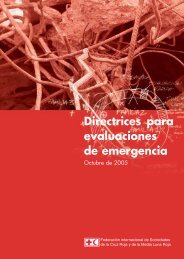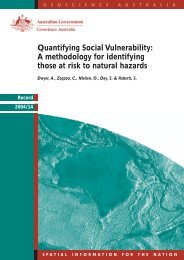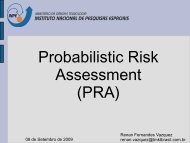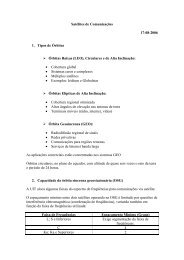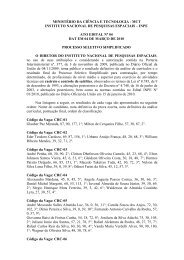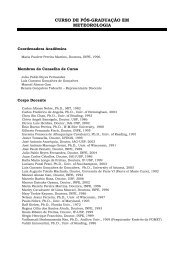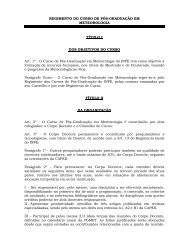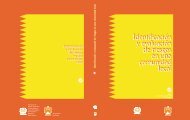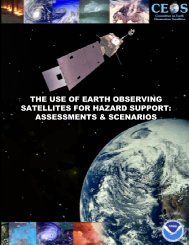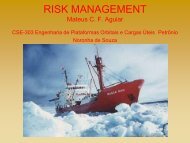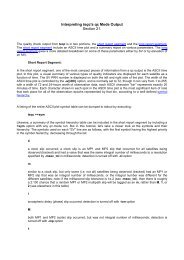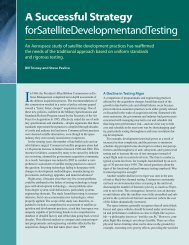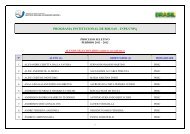Living with Risk. A global review of disaster reduction initiatives
Living with Risk. A global review of disaster reduction initiatives
Living with Risk. A global review of disaster reduction initiatives
Create successful ePaper yourself
Turn your PDF publications into a flip-book with our unique Google optimized e-Paper software.
international scientific voice on climate, climate<br />
variations and climate change. WCP has<br />
provided advanced climate database management<br />
systems to many countries, <strong>with</strong> applications<br />
in several areas <strong>of</strong> <strong>disaster</strong> mitigation,<br />
especially drought. WMO continues to assist<br />
its members in the development <strong>of</strong> techniques<br />
to assess and combat drought, desertification<br />
and other extreme events through its agricultural<br />
meteorology programme. Through its<br />
leadership <strong>of</strong> the ISDR Working Group on<br />
Climate and Disaster Reduction, WMO<br />
contributes to the <strong>review</strong> <strong>of</strong> sectoral systems<br />
<strong>with</strong>in and outside the United Nations that<br />
monitor climate sensitive emergencies. Of<br />
particular interest are the monitoring and<br />
prediction <strong>of</strong> climate-related natural <strong>disaster</strong>s<br />
associated <strong>with</strong> the El Niño and La Niña<br />
phenomena. The World Weather Research<br />
Programme (WWRP) is aimed at developing<br />
improved and cost-effective techniques for<br />
forecasting high-impact weather and at<br />
promoting their applications among countries.<br />
The Hydrology and Water Resources<br />
Programme assists the national hydrological<br />
services <strong>of</strong> member countries to assess the risk<br />
<strong>of</strong>, and forecast, water-related hazards, in<br />
particular major floods and droughts.<br />
WMO<br />
7 bis avenue de la Paix<br />
CH-1211 Geneva 2, Switzerland<br />
Tel: (+41-22) 730 8315<br />
Fax: (+41-22) 733 2829/730 8027<br />
E-mail: ipa@gateway.wmo.ch<br />
Web site: http://www.wmo.ch<br />
The World Bank Group<br />
Related international commitments and the UN role in <strong>disaster</strong> risk <strong>reduction</strong><br />
The World Bank Group, based in Washington,<br />
D.C., United States, is one <strong>of</strong> the<br />
world's largest sources <strong>of</strong> development assistance.<br />
It works in more than 100 developing<br />
countries. The World Bank Group consists<br />
<strong>of</strong> five closely associated institutions, all<br />
owned by member countries that carry ultimate<br />
decision-making power. Each institution<br />
plays a distinct role in the mission to<br />
fight poverty. The term "World Bank" refers<br />
specifically to the International Bank for<br />
Reconstruction and Development (IBRD)<br />
and the International Development Association<br />
(IDA). IBRD provides loans and<br />
development assistance to middle-income<br />
countries and creditworthy poorer countries.<br />
It is not a pr<strong>of</strong>it-maximizing organization<br />
but has earned a net income every year since<br />
1948, which is used to fund several developmental<br />
activities. The World Bank considers<br />
<strong>disaster</strong> <strong>reduction</strong> as an element in the fight<br />
against poverty linked to environmental<br />
management. In order to advance the goal<br />
<strong>of</strong> reducing the impact <strong>of</strong> <strong>disaster</strong>s advocated<br />
by ISDR, the World Bank updated its<br />
strategies and procedures to promote proactive<br />
ways to integrate <strong>disaster</strong> prevention<br />
and mitigation into its development work.<br />
IBRD, through its Disaster Management<br />
Facility (DMF), is a member <strong>of</strong> the Interagency<br />
Task Force on Disaster Reduction.<br />
DMF was established in July 1998 to<br />
promote <strong>disaster</strong> risk management as a<br />
priority issue for poverty <strong>reduction</strong>. DMF<br />
has worked actively to promote the integration<br />
<strong>of</strong> risk analysis into project design and<br />
the inclusion <strong>of</strong> effective prevention and<br />
mitigation measures into the Bank's Country<br />
Assistance Strategies. The staff has been<br />
trained to design safer investments empowering<br />
communities to reduce their vulnerability<br />
to <strong>disaster</strong>s. Furthermore, <strong>disaster</strong> risk<br />
management is being mainstreamed into the<br />
Bank's development efforts. Reconstruction<br />
projects, such as those carried out in the<br />
aftermath <strong>of</strong> the earthquake in Turkey, <strong>of</strong><br />
Hurricane Mitch in Central America and <strong>of</strong><br />
the January 2001 earthquake in Gujarat,<br />
India, have been designed to go beyond<br />
mere rebuilding and to focus on how to<br />
rebuild in a better way to strengthen<br />
resilience to future <strong>disaster</strong>s. Along the<br />
same lines, DMF pilot efforts are gradually<br />
being incorporated into Bank operations. A<br />
good example <strong>of</strong> this approach is in Mexico<br />
where, following a DMF case study to<br />
assess the capacity <strong>of</strong> the country to manage<br />
<strong>disaster</strong> risk, the Government requested the<br />
Bank to prepare a project aimed at reducing<br />
<strong>disaster</strong> losses.<br />
The Bank is also working closely <strong>with</strong> its<br />
partners through the ProVention Consortium,<br />
which serves as mechanism for the<br />
various partners to combine efforts to gener-<br />
6<br />
317



